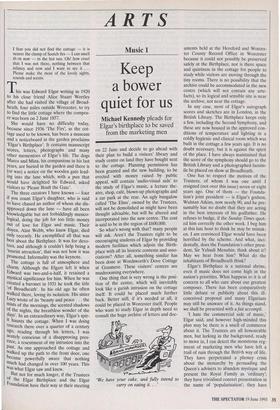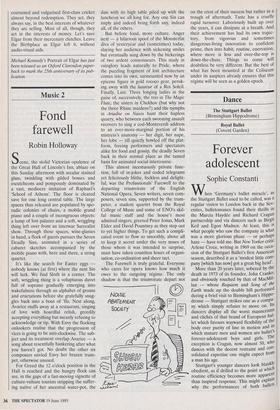ARTS
Music 1
Keep a bower quiet for us
Michael Kennedy pleads for Elgar's birthplace to be saved from the marketing men
I fear you did not find the cottage — it is nearer the clump of Scotch firs — I can smell th:m now — in the hot sun. Oh! how cruel that I was not there, nothing between that infancy and now and I want to see it . Please make the most of the lovely sights, sounds and scents.
This was Edward Elgar writing in 1920 to his close friend Alice Stuart Wortley after she had visited the village of Broad- heath, four miles outside Worcester, to try to find the little cottage where the compos- er was born on 2 June 1857.
She would have no difficulty today, because since 1936 'The Firs', as the cot- tage used to be known, has been a museum and a noticeboard in the garden proclaims `Elgar's Birthplace'. It contains manuscript scores, letters, photographs and many other mementoes of Elgar's life. The dogs Marco and Mina, his companions in his last Years, are buried in the garden and there is (or was) a notice on the wooden gate lead- ing into the lane which, with a pun that would have delighted Sir Edward, asked visitors to 'Please Boult the Gate'.
The three curators I have known — four if you count Elgar's daughter, who is said to have chased an author of whom she dis- approved down the lane — have all been knowledgable but not forbiddingly musico- logical, doing the job for too little money out of love for Elgar and music. Their doyen, Alan Webb, who knew Elgar, died only recently. He exemplified all that was best about the Birthplace. It was for devo- tees, and although it couldn't help being a tourist attraction', that was not how it was Promoted. Informality was the keynote.
The cottage is full of atmosphere and charm. Although the Elgars left it when Edward was two-and-a-half, it retained a mystical significance for him. When he was created a baronet in 1931 he took the title of Broadheath'. In his old age he often walked there, loving its isolation. His sisterLucy wrote of its 'beauty and peace . . . the
mists of the mornings, the scented shadows of the nights, the breathless wonder of the days'. In an extraordinary way, Elgar's spir- it haunts the cottage. When I was doing research there over a quarter of a century ago, reading through his letters, I was acutely conscious of a disapproving pres- ence, a resentment of my intrusion into the Past. As one approached the cottage and walked up the path to the front door, one became powerfully aware that nothing Much had changed in over 100 years. This Was what Elgar saw and knew. But not for much longer, if the Trustees of the Elgar Birthplace and the Elgar l'oundation have their way at their meeting
on 22 June and decide to go ahead with their plan to build a visitors' library and study centre on land they have bought next to the cottage. Planning permission has been granted and the new building, to be erected with money raised by public appeal, will contain 'audio-visual aids' to the study of Elgar's music, a lecture the- atre, shop, café, blown-up photographs and a car park at the rear. An ugly bungalow called 'The Elms', owned by the Trustees, will not be demolished as might have been thought advisable, but will be altered and incorporated into the new centre. The cost is said to be in the region of £600,000.
So what's wrong with that? many people will ask. Aren't the Trustees right to be encouraging students of Elgar by providing modern facilities which adjoin the Birth- place with all its historic contents and asso- ciations? After all, something similar has been done at Wordsworth's Dove Cottage at Grasmere. These visitors' centres are mushrooming everywhere.
One thing that is very wrong is the posi- tion of the centre, which will inevitably look like a garish intrusion on the cottage itself. It could be placed much further back. Better still, if it's needed at all, it could be placed in Worcester itself. People who want to study Elgar in depth need to consult the huge archive of letters and doc- 'We have your cake, and fully intend to carry on eating it. . uments held at the Hereford and Worces- ter County Record Office in Worcester because it could not possibly be preserved safely at the Birthplace, nor is there space and quietness in the cottage for people to study while visitors are moving through the tiny rooms. There is no possibility that the archive could be accommodated in the new centre (which will not contain any arte- facts), so its logical and sensible site is near the archive, not near the cottage.
In any case, most of Elgar's autograph scores and sketches are in London, in the British Library. The Birthplace keeps only a few, including the Second Symphony, and these are now housed in the approved con- ditions of temperature and lighting in a coldly hygienic and clinical room which was built in the cottage a few years ago. It is no doubt necessary, but it is against the spirit of the place. I have always maintained that the score of the symphony should go to the British Library and a photographed facsim- ile be placed on show at Broadheath.
One has to respect the motives of the Trustees, of whom I was one until I resigned (not over this issue) seven or eight years ago. One of them — the Founda- tion's joint president — is Elgar's godson, Wulstan Atkins, now nearly 90, and he pre- sumably has no doubt that they are acting in the best interests of his godfather. He refuses to budge, if the Sunday Times quot- ed him correctly the other week. I beg him at this late hour to think he may be mistak- en. I am convinced Elgar would have been horrified by the scheme. And what, inci- dentally, does the Foundation's other presi- dent, Sir Yehudi Menuhin, think about it? May we hear from him? What do the inhabitants of Broadheath think?
Elgar's Birthplace is a national shrine, even if music does not come high in the nation's priorities. What happens to it is of concern to all who care about our greatest composer. There has been comparatively little debate or publicity about this ill- conceived proposal and many Elgarians may still be unaware of it. As things stand, we shall be presented with a fait accompli.
`I hate the commercial side of music,' Elgar said, and however high-minded this plan may be there is a smell of commerce about it. The Trustees are all honourable men, but lurking in the background, ready to move in, I can detect the monstrous reg- iment of marketing men who have left a trail of ruin through the British way of life. They have perpetrated a phoney crisis about the monarchy by persuading the Queen's advisers to abandon mystique and present the Royal Family as 'ordinary% they have trivialised concert presentation in the name of 'popularisation% they have
coarsened and vulgarised first-class cricket almost beyond redemption. They act, they always say, in the best interests of whatever they are selling. Most of all, though, they act in the interests of money. Let's save Elgar from their mercenary clutches. Leave the Birthplace as Elgar left it, without audio-visual aids.
Michael Kennedy's Portrait of Elgar has just been reissued as an Oxford Clarendon paper- back to mark the 25th anniversary of its pub- lication.



















































 Previous page
Previous page